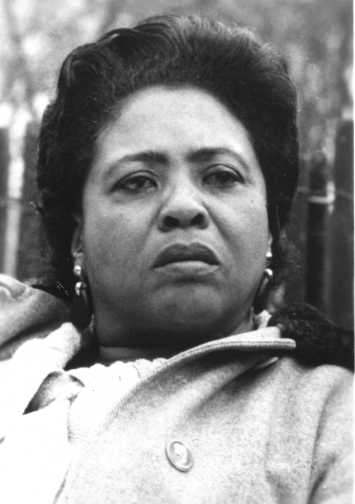For Black History Month, we’re profiling Black leaders in the disability rights movement. Check back all month for more!
“I’m sick and tired of being sick and tired.” Decades after they were spoken in 1964, civil rights activist Fannie Lou Hamer’s words continue to resonate for their illustration of the plight of Black people, particularly in the American South, in the fight for civil rights. Hamer, who lived with several disabilities, led the charge in registering Black people in Mississippi to vote, and co-founded the Mississippi Freedom Democratic Party. 
Born in 1917 to a large Mississippi sharecropping family, Fannie Lou Hamer was the youngest of 20 children. She dropped out of school at a young age to work full time in cotton fields in order to help provide for her family. Hamer was sterilized without her knowledge, leaving her unable to bear children, although she and her husband later adopted four children. She lived with the long-term effects of polio, and a violent beating in 1963 in a Mississippi jailhouse left her with kidney damage, a blood clot behind one eye, and a permanent limp.
These obstacles did not stop Hamer’s activism. During her lifetime, Hamer organized a strike for Black cotton pickers, worked alongside the National Council of Negro Women to establish farm cooperatives and banks for poor residents to have better food access, advocated for more federal funding for Head Start programs and housing, and helped form the National Women’s Political Caucus to encourage women’s participation in politics.
Perhaps the most notable part of her career was her work registering African Americans to vote. In 1962, Hamer and 17 others traveled to an Indianola courthouse to register. At the time, citizens were forced to pass literacy tests in order to vote—a racist effort to disenfranchise Black people—and it took Hamer three tries to finally pass the test and register to vote. Hamer was fired from the plantation she and her husband worked on for decades because of her efforts, but that only redoubled her dedication to fighting for civil rights.
Shortly after forming the Mississippi Freedom Democratic Party in 1964, Hamer for Congress. Although she lost her bid, her run put Mississippi and its systemic racism into the spotlight. Hamer died in 1977 of breast cancer in Mississippi, leaving behind a legacy for the activists of today to model. Her efforts to give voice to marginalized groups were foundational to the Civil Rights movement, the women’s rights movement, and the disability rights movement. Today we honor her as part of Black History Month.
Comments are closed.